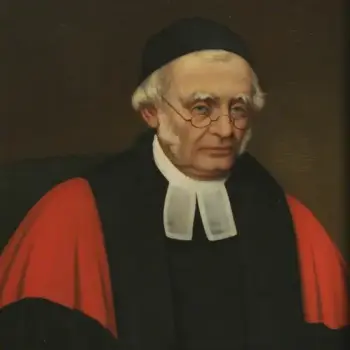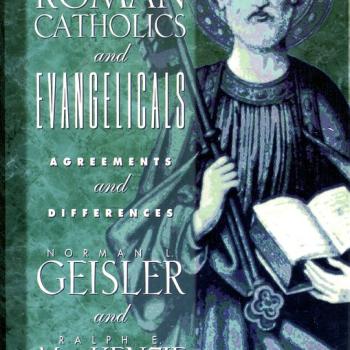Ecumenism in St. Thomas Aquinas

Thomas Aquinas, by Fra Bartolomeo (1472-1517) [public domain / Wikimedia Commons]
***
(Edited by Dave Armstrong, from forwarded e-mail letters: 1 August 1999)
***
The meeting in Assisi (27 October 1986) is a very complex issue: there are a lot of issues here, and it is necessary to study all of them and – above all – [to] make the proper distinctions. In my mail I intended only to give a moral evaluation of the act itself and show that it was morally unexceptionable. Initially we must ask ourselves: “Did the pope sin in the Assisi meeting?” John Paul II theorized also, in his speeches, theological justifications of this act. We must ask ourselves “Are these justifications correct or heretical?”
After this we must pose to ourselves a second kind of question: “Was this act advisable or did this act create scandal and disadvantages which were more numerous than advantages?” And then we can examinate correlated facts, such as the statue of Buddha placed on top of the tabernacle. “What is the value of prayers of infidels?,” etc. Every man must be religious, by natural law; if the prayers of infidels are always a sin, we would have a contradiction between natural law and positive divine law; but we cannot admit this.
A third kind of question would be: “Is there a difference between John Paul II’s theology and that of many progressist theologians, who teach all religions are equivalent.” A study of this kind reveals gigantic differences! Why, among principal progressive theologians (Rahner, Kung, feminist theology, etc), nobody aplauded this act?
Another important question: “Is John Paul II’s teaching contradictory to the teaching of other popes”? Before trying to answer to this question, let’s ask ourselves: “How many people read a large part of the magisterium about this issue; is it sufficent to read two or three encyclicals to judge living papal teaching? How many Catholics know or have read papal speeches about Assisi?
So, let’s go step by step, with great patience. I’m only a poor parish priest of a mountain village that tries to give answers. There is an Italian proverb that says; “when there are not horses, donkeys run.” We must look for traditional answers merging the teaching of John Paul II, the teaching of previous popes, and the teaching of Scholastic theologians about the salvation of unbelievers.
It’s a work of pioneers, which will be useful if we will make our way with great humility, patience and great love for the pope. I ask myself: Before thinking that the pope has “false and erronous ideas and practices,” isn’t it necessary that I try to make any effort to understand His acts? Between the pope and myself, who has more probability to blunder? Have I well understood what the pope did, what he said, the remote context of his affirmations? Have I looked for a solution in texts by approved scholars? Am I sure my opinion is a definitive verdict about the Holy Father?
Another priest wrote:
- The problem is that if you invite people to do something, this very invitation constitutes a “FORMAL” participation. Invite someone to do a bank robbery…or to steal… this is becoming responsible for it, because by your invitation you “cause” it. By his invitation to all religions to come to Assisi for prayer, the Pope caused these prayers and invited to idol worship. (Praying to water for peace (sic!), praying to the “Great Thumb” for peace, praying to the man Buddha for peace…).
Somebody posed me the objection of scandal or correct understanding of Assisi; we can talk about this aspect of the issue after we bring to an end the question of the act itself. We may debate the consequences of the act after full examination of the act itself. Nevertheless, I will try to answer every question list members pose to me.
We have here a shifting of accent: we have to distinguish between the act itself fulfilled by the pope (staying together to pray) and the organization of the meeting. Nevertheless the pope has some responsibility for this organization: is it a sin to invite unbelievers to pray? To answer to this question, we must ask ourselves: “must an unbeliever pray?”
I call up here a distinction by St.Thomas:
- a) “Unbelief by way of pure negation” (infidelitas secundum negationem puram) in case a man may “be called an unbeliever merely because he has not the faith” “in those who have heard nothing about the faith”; this Unbelief is not a sin -and b) “Unbelief by way of opposition to the faith” (infidelitas secundum contrarietatem ad fidem) when “a man refuses to hear the faith” (S.Th II II, 10,1 c); this Unbelief is a sin.
The fact that “unbelief by way of pure negation” is not a sin, is not only a Thomist concept, but it’s also a verity of faith: St. Pius V condemned the proposition “Infidelitas pure negativa in his quibus Christus non est predicatus peccatum est” (D +1068) (= Purely negative unbelief, in those whom Christ was not preached to, is a sin).
A great Thomist theologian , De Victoria, specified also the degree of necessary predication, in order that negative unbelief become positive: it’s necessary for not only a simple presentation of faith, but a presentation including all necessary motives of credibility. In fact St. Thomas teaches that “Nobody would believe if he doesn’t see he must believe” (non enim crederet nisi videret ea esse credenda – S.Th., II II, q. 1, a. 4 ad 2). Only God knows the degree of innocence or culpability in the heart of unbelievers.
So we can pose a more definite question: must an unbeliever (an unbeliever by way of pure negation) pray? I think the answer is “yes,” because, according to St. Thomas’s teaching, we know that religion is a part of Justice, and Justice is an obligation by natural law. Every man must be religious, because every man must be upright (iustus). Prayer is an act of religion (not an act of faith), so every man must pray. So we must say to an unbeliever: follow natural law; you must be prudent, temperant, strong, upright.
St. Thomas says:
- Now the Divine law which is the law of grace, does not do away with human law (non tollit ius humanum) which is the law of natural reason. S. Th., II II, q. 10, a. 10 c.
How is it possible that God orders man to be religious, knowing that men (today the majority of humankind), although unbelievers “by way of pure negation,” performing this precept, will sin? If an unbeliever doesn’t pray, he sins (against natural law). If an unbeliever prays, he sins, because He doesn’t pray to the true God. This would be a trap!
Therefore, I conclude that invitation to unbelievers to pray, is not a formal participation in an act of false religion, but is a formal invitation to be religious, to follow natural law. The pope doesn’t says: “Pray to a false God,” but “Pray [as best you can].” Everything false in such act of religion, becomes an “indirect voluntary” (as the death of a child in case of removal of a cancerous uterus).
But now there are some new questions: Why must man be religious if he cannot know true religion? May an act of religion be specified by a false material object (as the one of false religion)? According to St. Thomas, the exercise of religion by an unbeliever may be a sort of natural preparation to receive grace: In IV Sent., II, d. 28 q. 1, a. 4 ad 4:
- It’s possible, by natural reason, getting ready to have faith… If anyone, among pagan people, does as much he can (quod in se est faciat), God will reveal to him what is necessary for salvation, or by an inspiration that he will give him or by a savant whom He will send to him.
- (…etiam ad fidem habendam aliquis se praeparare potest per id quod in naturali ratione est; unde dicitur, quod si aliquis in barbaris natus nationibus, quod in se est faciat, deus sibi revelabit illud quod est necessarium ad salutem, vel inspirando, vel doctorem mittendo. Unde non oportet quod habitus fidei praecedat praeparationem ad gratiam gratum facientem; sed simul homo se praeparare potest ad fidem habendam, et ad alias virtutes et gratiam habendam).
S. Th., I II, 109 6 c
- ..The preparation of the human will for good is twofold: the first, whereby it is prepared to operate rightly and to enjoy God; and this preparation of the will cannot take place without the habitual gift of grace, which is the principle of meritorious works, as stated above. There is a second way in which the human will may be taken to be prepared for the gift of habitual grace itself. Now in order that man prepare himself to receive this gift, it is not necessary to presuppose any further habitual gift in the soul, otherwise we should go on to infinity. But we must presuppose a gratuitous gift of God, Who moves the soul inwardly or inspires the good wish…
So the prayer of an unbeliever “by way of pure negation”, even though materially false, is a fulfilment of natural law given by God Himself- a preparation to Grace.
I say with St Paul:”…I will not even be the judge of my own self. It is true that my conscience does not reproach me, but that is not enough to justify me: it is the Lord who is my judge” (1 Cor. 4:3-4). I dont’ know; nobody cannot know the degree of innocence of unbelievers. But in a missionary approach, it is natural to suppose the good faith of our interlocutor. Nobody knows our true disposition, not even we ourselves (with absolute certainty); so, nobody will begin a missionary dialogue with an unbeliver saying: “Dear sir, I don’t know your degree of innocence; maybe my effort is vain because you are not an unbeliever by way of negation: so you will go to hell; but, in case you are an unbeliever by way of negation, in this case we will accomplish something positive.”
None among traditional missionaries begins his speech in a such manner. All missionary speeches hope for the good faith of the interlocutor. The fact that a missionary knows that not all men are good, doesn’t exempt him from trying to convert, step by step, all men. And the first step of conversion is the observance of natural law. In addition, although we know not all men are in good faith, we don’t know which are good or bad people. I didn’t say “in Assisi all people were good,” but rather, “it was allowable to invite all men to pray, hoping they were in good faith.”
We must distinguish the virtue of religion before and after original sin. If Adam hadn’t sinned, what an easy issue the demonstration of the existence of God would have been! But after original sin, as Vatican I teaches, a clear concept of God is very difficult, and we have the moral necessity of revelation also for verities that are recognizable, themselves, by natural reason. The most intelligent -perhaps- of pagan people, Aristotle, conceived an idea of God that is not true. (Hegel is more Aristotelian than St. Thomas: our St Thomas has substantially changed Aristotle’s concept of God). I don’t believe particular judgment will be an “examination of methaphysics”: nevertheless what St Paul writes is true and it must be well understood.
Here it is opportune to examine the “Unknown God” of Acts 17:23:
What is the history of this cult to the “Unknown God”?: St. John Chrysostom tells us the story, when the Athenians send Philippides to ask help for Sparta, in his travel he had a spectral vision of a mysterious personage, who said to him: “Why don’t you worship me? I will help you.” Hence the worship to an “Unknown God.” But the great Card. Baronius gives another explication, which is not irreconciliable with the previous one. Athenians were understanding that was impossible to attribute to their gods the peculiarities of the idea of “to be” (esse): the natural, implicit, perception of vanity of idols let them think of a quite different god, whose attributes were not yet definite. It’s reasonable that people who enunciated such sophisticated concepts of “to be” (esse), were dissatisfied with idols. So the “Unknown God” was the object of this interior query of a true God, “unknown” because “not yet known.”
All these premises indicate that many idolatrous cults of antiquity (as some contemporaneous people) were not formally idolatrous, because there was not formal attribution of divine attributes to idols (such as eternity, first principle, plenitude of being, etc.). What I wrote is not only an hypothis, but a scientific statement of the Ethnologic School of History of Religions. The great Wilhem Schmidt, author of the monumental work Ursprung der Gottesidee (Origin of the Idea of God) shows that a lot of people and primitive religions, – even though they had worship that, at first glance, we could define as idolatrous-, all these people believed in a one principal God, and only this god had attributes such as eternity, universal causality, infinity, providence etc.
In the case of unbelievers by way of negation, this idolatry can be reduced to a (at least sometimes) not culpable “vain observance” or to a vain observance that is not irreconcilable with natural law. Implicit faith is impossible within the context of formal idolatry; but I think it’s very difficult to find truly formal idolatry because it’s difficult, after original sin, conceiving the idea of God that must attributed to idols to be idolatrous in the proper sense.
Let’s imagine asking a primitive biblical Canaanite; “which idea of God are you attributing to your idols?” What could he answer? Could he answer “ipsum esse subsistens,” “esse per se et non per partecipationem”? (I don’t want to say that there were not also truly pagan gnostic mythologies). We can understand biblical maledictions against idolatry, to preserve true religion among Jews. But we must believe that God also loves the Canaanites and othersunbelievers and that he also offered salvation to them.
There were no Satanists at Assisi. Obviously the acts of natural religon that can prepare for grace must be compatible with all natural law; so we must exclude sexual or magic practices etc. But in Assisi the issue was the prayer.
If someone ascribes to “The Blue Elephant” authentic divine preogatives, it’s impossible for them to have implicit faith. If someone doesn’t ascribe to “The Blue Elephant” authentic divine prerogatives, and someone understands he must be religious, and there is also the perception of the necessity of existence of a God quite different, it’s possible this can be, “per accidens” a preparation to grace. We can extend here the principle of “erroneous conscience in invincible manner.”
We don’t forget that God doesn’t give impossible orders. If natural law orders man to be religious, we have two solutions.
A) God tolerates vain observance of a lot of ignorant people, substantially not idolatrous.
B) God orders to be religious without giving the means to be religious.
But we cannot admit B.
We must not forget also that God dispenses his grace to this concrete man after original sin: and God knows the difficulties of building a natural theology.
The invitation for Assisi was an invitation to do “as much as anyone can”, as St. Thomas wrote “quod in se est facit,” preparing oneself in this manner to receiving grace. And this invitation is possible, without betting one dollar on the good faith of participants at the meeting.
May we assume a good act of religion expressing veneration to false gods?
Let’s consider Cornelius the centurion:
- Acts 10:1 One of the centurions of the Italica cohort stationed in Caesarea was called Cornelius. 10:2 He and the whole of his house hold were devout and God-fearing, and he gave generously to Jewish causes and prayed constantly to God. 10:3 One day at about the ninth hour he had a vision in which he distinctly saw the angel of God come into his house and call out to him, “Cornelius!” 10:4 He stared at the vision in terror and exclaimed, “What is it, Lord?” The angel answered, “Your prayers and charitable gifts have been accepted by God.”
I don’t want suggest solutions “sola scriptura”!:-)) But, as an alternative, I would like to survey how medieval theologians – especially our St.Thomas – considered the prayer of a pagan man before his conversion.
Certainly his prayer – before conversion – was not the right worship at all; Cornelius’ religion was not “THE true religion.” But, nevertheless, this prayer was accepted by God. And why were Cornelius’ prayers “accepted by God”? Because – St. Thomas says, he had “implicit faith.” Well, we find ourselves in front of a prayer of a pagan, who had “implicit faith.” Let’s note that this is a prayer after the coming of Jesus Christ.
We find ourselves, about this issue, between two great theological errors: the necessity of faith to be absolutely explicit: in this perspective (Jansenist et al), man would have to have explicit cognition of all the verities of faith to be saved — and, on the other side, a faith as an a priori act; in this perspective, any worship of any indefinite god — regardless of the content of this act — would be sufficient to make every man a Christian. This is – substantially and in the broadest sense – the Anonymous Christian Theory, at least as this theory is vulgarized.
But now, let’s return to the heart of the issue:
The prayer of Cornelius was a false worship, but it has been made a good prayer by faith; an implicit faith:
S Th. II II q. 10 a. 4 ad 3 (in some editions ad 4):
With regard, however, to Cornelius, it is to be observed that he was not an unbeliever, else his works would not have been acceptable to God, whom none can please without faith. Now he had implicit faith, as the truth of the Gospel was not yet made manifest: hence Peter was sent to him to give him fuller instruction in the faith.
(De Cornelio tamen sciendum est quod infidelis non erat, alioquin eius operatio accepta non fuisset deo, cui sine fide nullus potest placere.Habebat autem fidem implicitam, nondum manifestata evangelii veritate. Unde ut eum in fide plene instrueret, mittitur ad eum Petrus).
But may we compare Cornelius, who was very near to true religion, with a Hindu or an animist, very far from Truth? Yes, we may! Let’s hear St. Thomas:
in IV Sent, III d. 25 q. 2 a. 2
- We must know that Cornelius had explicit faith about the mystery of Incarnation, nevertheless it would be sufficient to him in order to salvation, even in case he had implicit faith about this.
- (sciendum, quod Cornelius habebat fidem explicitam de mysterio incarnationis, quamvis suffecisset ei ad salutem, etiamsi de hoc fidem implicitam habuisset).
Why may St.Thomas say that? Because, formally, the one who doesn’t acknowledege even one article of faith, sins aginst all faith! Here nothing is more true than James 2:10: “You see, anyone who keeps the whole of the Law but trips up on a single point, is still guilty of breaking it all.” We cannot judge an unbeliever by way of pure negation looking at how much he believes absolutely – because only a little less would be a sin against faith; “one more one less” destroys faith; the criterion must be quite different: We must look at the disposition of the subject and how much is explicit Truth that God revealed to him. The whole – we may take as point of reference – is not the whole faith itself, but the the faith as much as it is revealed to the particular unbeliever.
Before we advance in our study, here is another important quotation that shows that the degree of explicit faith may be very small and quite sufficient for salvation.
II II ,a. 2 q. 7 ad 3.
Title of the question: “Whether it is necessary for the salvation of all, that they should believe explicitly in the mystery of Christ?”
Some pagan people got salvation,
- though they did not believe in Him explicitly, they did, nevertheless, have implicit faith through believing in Divine providence, since they believed that God would deliver mankind in whatever way was pleasing to Him.
Conclusion: It’s possible that worship by an unbeliever (by way of pure negatin) can be accepted by God. It’s the implicit faith, the supernatural grace, which makes this act acceptable. The natural obligation to be religious doesn’t trap the unbeliever so that “he must sin by natural law”: the unbeliever finds the divine rescue: the gift of implicit faith. The implicit faith may be, materially, very poor.
We must now ask ourselves, “What exactly is implicit faith?”
II II ,a. 2 q. 7 ad 3.
Reply to Objection 3. Many of the gentiles received revelations of Christ, as is clear from their predictions. Thus we read (Job 19:25): “I know that my Redeemer liveth.” The Sibyl too foretold certain things about Christ, as Augustine states (Contra Faust. xiii, 15). Moreover, we read in the history of the Romans, that at the time of Constantine Augustus and his mother Irene a tomb was discovered, wherein lay a man on whose breast was a golden plate with the inscription: “Christ shall be born of a virgin, and in Him, I believe. O sun, during the lifetime of Irene and Constantine, thou shalt see me again” [Cf. Baron, Annal., A.D. 780. If, however, some were saved without receiving any revelation, they were not saved without faith in a Mediator, for, though they did not believe in Him explicitly, they did, nevertheless, have implicit faith through believing in Divine providence, since they believed that God would deliver mankind in whatever way was pleasing to Him, and according to the revelation of the Spirit to those who knew the truth, as stated in Job 35:11: “Who teacheth us more than the beasts of the earth.
St. Thomas Aquinas (1225-1274) Summa Theologica Second Part of the Second Part Question 5 Article 3:
- Whether a man who disbelieves one article of faith, can have lifeless faith in the other articles?
Objection 1. It would seem that a heretic who disbelieves one article of faith, can have lifeless faith in the other articles. For the natural intellect of a heretic is not more able than that of a Catholic. Now a Catholic’s intellect needs the aid of the gift of faith in order to believe any article whatever of faith. Therefore it seems that heretics cannot believe any articles of faith without the gift of lifeless faith.
Objection 2. Further, just as faith contains many articles, so does one science, viz. geometry, contain many conclusions. Now a man may possess the science of geometry as to some geometrical conclusions, and yet be ignorant of other conclusions. Therefore a man can believe some articles of faith without believing the others.
Objection 3. Further, just as man obeys God in believing the articles of faith, so does he also in keeping the commandments of the Law. Now a man can obey some commandments, and disobey others. Therefore he can believe some articles, and disbelieve others.
On the contrary, Just as mortal sin is contrary to charity, so is disbelief in one article of faith contrary to faith. Now charity does not remain in a man after one mortal sin. Therefore neither does faith, after a man disbelieves one article.
I answer that, Neither living nor lifeless faith remains in a heretic who disbelieves one article of faith.
The reason of this is that the species of every habit depends on the formal aspect of the object, without which the species of the habit cannot remain. Now the formal object of faith is the First Truth, as manifested in Holy Writ and the teaching of the Church, which proceeds from the First Truth. Consequently whoever does not adhere, as to an infallible and Divine rule, to the teaching of the Church, which proceeds from the First Truth manifested in Holy Writ, has not the habit of faith, but holds that which is of faith otherwise than by faith. Even so, it is evident that a man whose mind holds a conclusion without knowing how it is proved, has not scientific knowledge, but merely an opinion about it. Now it is manifest that he who adheres to the teaching of the Church, as to an infallible rule, assents to whatever the Church teaches; otherwise, if, of the things taught by the Church, he holds what he chooses to hold, and rejects what he chooses to reject, he no longer adheres to the teaching of the Church as to an infallible rule, but to his own will. Hence it is evident that a heretic who obstinately disbelieves one article of faith, is not prepared to follow the teaching of the Church in all things; but if he is not obstinate, he is no longer in heresy but only in error. Therefore it is clear that such a heretic with regard to one article has no faith in the other articles, but only a kind of opinion in accordance with his own will.
Reply to Objection 1. A heretic does not hold the other articles of faith, about which he does not err, in the same way as one of the faithful does, namely by adhering simply to the Divine Truth, because in order to do so, a man needs the help of the habit of faith; but he holds the things that are of faith, by his own will and judgment.
Reply to Objection 2. The various conclusions of a science have their respective means of demonstration, one of which may be known without another, so that we may know some conclusions of a science without knowing the others. On the other hand faith adheres to all the articles of faith by reason of one mean, viz. on account of the First Truth proposed to us in Scriptures, according to the teaching of the Church who has the right understanding of them. Hence whoever abandons this mean is altogether lacking in faith.
Reply to Objection 3. The various precepts of the Law may be referred either to their respective proximate motives, and thus one can be kept without another; or to their primary motive, which is perfect obedience to God, in which a man fails whenever he breaks one commandment, according to James 2:10: “Whosoever shall . . . offend in one point is become guilty of all.
(Translated by the Fathers of the English Dominican Province. Copyright © 1947 Benzinger Brothers Inc., Hypertext Version Copyright © 1995, 1996 New Advent Inc.)
There is a witty Italian witty proverb that says: “Did you want the bike? Now pedal!” You posed me a lot of questions about Assisi, and now endure my answers! :-)) Well, where did we leave off?
We have now to deal bravely with a decisive issue, because HERE is the difference between Assisi and modernism, false ecumenism, panchristianism etc.
The issue is about the contents of implicit faith: any faith, more or less explicit, must have contents – more exactly, supernatural revealed contents -, otherwise it would not be faith, but human thought. According to modernists, religion is the emerging of religious feelings: for modernists, the content of this feeling is not important: a good existential outcome of this religious sentiment is sufficient. So they reason: “Are you contented or satisfied to be a Buddhist or to practice Your homemade religion? Let this sentiment emerge! If you let your religious sentiment emerge, you are a Christian, even though you are not conscious of being a Christian.”
What is the difference between implicit faith, as we have learned by St.Thomas, and this modernist conception? The differences concern dispositions of the subject, and the object itself. Man knows, by natural reason, that he must pursue his ultimate end; man knows this end is good, lovely; so he desires to pursue his ultimate end. Grace manages to get into this natural desire, and so this natural desire becomes supernatural; this is the psychological beginning of the act of faith. There are already important differences between the Catholic and modernist conceptions of faith.
God himself reveals the means of act of faith, the objective contents, even though this knowledge may be not completely explicit. Gods acts in two manners:
1) with his natural providence; an unbeliever can admire the creation (Rom. 1:20: ever since the creation of the world, the invisible existence of God and his everlasting power have been clearly seen by the mind’s understanding of created things) and believe (but he may also not believe); or God sends a missionary to the unbeliever.
2) with an immediate supernatural inspiration: we can read the autobiography of some convert, and admire their reflections. But we cannot exclude mysterious inspirations in the hearts of a lot of unbelievers: may we think that a poor primitive in Amazonia or in Asia is forgotten by God?
In both cases, a truth, a content, a supernatural – implicit or explicit – revelation, is proposed to man. A good will wants, “chooses,” all these means God revealed to her.
St. Thomas says, about such unbelievers -a man that doesn’t believe by way of pure negation, as Cornelius, but adheres to everything God reveals to him, that “he does as much he can (quod in se est facit) – he is not, formally, an unbeliever – he has implicit faith.”
In, this sense we may better understand the word by Fr. Garrigou-Lagrange: “Formally are more far from true religion people who deviated preserving many dogmas than people who tend to Catholicism embracing few verities.”
A primitive man in the jungle, who “does as much he can”, has more faith than a dissident theologian! And we have the same faith of the primitive man – in this sense we believe in the same God -, but we have not the same faith of a dissident theologian, and we don’t believe in the same God as the dissident theologian, even though he can understand trinitarian procession better than us. We can so understand what St. Paul says in Acts 17:23 “…the unknown God you revere is the one I proclaim to you.” In another sense, we have not the same God of the primitive, but we have the same God of the dissident theologian (from a merely material point of view). In this last sense is true that gods of pagan people are devils.
We can understand also why Pope St. Pius X says, in Pascendi, that modernism is the enemy not only of the Catholic religion, but of all religions: because the act of religion, the act that could precede a conversion, is basically undermined. So Fr. Cornelius a Lapide says that in the last days, the Antichrist will fight against all religion!
I tried only to begin to study the facts of Assisi: you didn’t read the complete argumentation which would be necessary, but only few e-mails by a mountain priest. I believe I have shown that Assisi is not only a question of ecumenism, but that a lot of issues are implied. We cannot have an unconscious tour d’esprit: “Mortalium Animos didn’t provide for Assisi, so Assisi is an heinous fact.” There are some new facts that are not in pre-conciliar handbooks; and we must be able to evaluate them in a serene manner. The battle for traditional liturgy, for Catholic Tradition et al, expects “new wine in fresh skins” (Luke 5:38).
And what must we say about ecumenism? I confess that when I hear this word, my hair stands on end! :-)) But let’s forget for a moment this word. Must we try any effort in order that unbelievers convert themselves! Yes, we must. May we compel the act of faith? No, we may not. May we try to persuade and convince them with arguments? Yes! And how do we begin this persuasion? “Hi Protestant; your mother was not an honest woman! Convert yourself, otherwise hell will gulp you down,” or trying to not “break the crushed reed or snuff the faltering wick” (Is. 42:3)? Trying to not break the crushed reed or snuff the faltering wick . . . And is this a missionary action? Yes, it’s a missionary action. And must we be missionaries? Yes, we must. Is the term ecumenism abused and used to pass the worse foul errors? Yes, but we must be missionaries even though the term is abused.
















